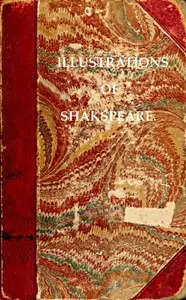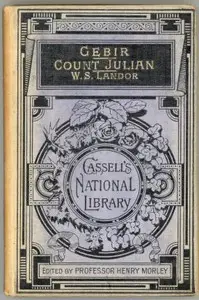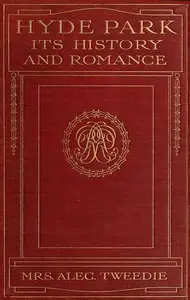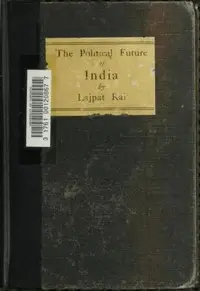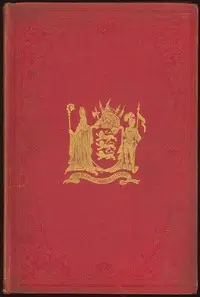"Citation and Examination of William Shakspeare" by Walter Savage Landor is a dramatized history that resurrects a moment where a young William Shakespeare faces accusations of deer-stealing before Sir Thomas Lucy. Set against the backdrop of Elizabethan England, the story balances humor with serious themes of justice, reputation, and the pursuit of dreams, particularly evident in Shakespeare's character. The tension begins with Shakespeare's appearance before the magistrate, where a playful yet serious atmosphere is created. Shakespeare uses his sharp wit to cleverly navigate the charges laid against him, engaging in lively verbal sparring with Sir Thomas and his chaplain, Silas Gough, deflecting consequences through his inventive defenses. This examination reveals not only Shakespeare's quick mind but also provides a window into the social customs of the time, mixing historical fiction with a lighthearted commentary on right and wrong.
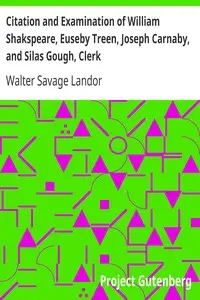
Citation and Examination of William Shakspeare, Euseby Treen, Joseph Carnaby, and Silas Gough, Clerk
By Walter Savage Landor
Accused of poaching, a young wordsmith must rely on his sharp wit to outsmart the law and protect his future.
Summary
About the AuthorWalter Savage Landor was an English writer, poet, and activist. His best known works were the prose Imaginary Conversations, and the poem "Rose Aylmer," but the critical acclaim he received from contemporary poets and reviewers was not matched by public popularity. As remarkable as his work was, it was equalled by his rumbustious character and lively temperament. Both his writing and political activism, such as his support for Lajos Kossuth and Giuseppe Garibaldi, were imbued with his passion for liberal and republican causes. He befriended and influenced the next generation of literary reformers such as Charles Dickens and Robert Browning.
Walter Savage Landor was an English writer, poet, and activist. His best known works were the prose Imaginary Conversations, and the poem "Rose Aylmer," but the critical acclaim he received from contemporary poets and reviewers was not matched by public popularity. As remarkable as his work was, it was equalled by his rumbustious character and lively temperament. Both his writing and political activism, such as his support for Lajos Kossuth and Giuseppe Garibaldi, were imbued with his passion for liberal and republican causes. He befriended and influenced the next generation of literary reformers such as Charles Dickens and Robert Browning.


![The Works of William Shakespeare [Cambridge Edition] [Vol. 4 of 9] by William Shakespeare](https://cdn.a2-host.cloud/ZB_R-dLuhWLwdUbSU0SE67gHJkVboDha4tIOYAinoNs/rs:fill:215:325:0/g:ce/aHR0cHM6Ly9zcC1hc3NldHMuczMudXMtd2VzdC0wMDQuYmFja2JsYXplYjIuY29tL2Jvb2svNTAwOTUvVGhlX1dvcmtzX29mX1dpbGxpYW1fU2hha2VzcGVhcmVfQ2FtYnJpZGdlX0VkaXRpb25fVm9sXzRfb2ZfOV9jb3Zlci5qcGc.webp)
![Shakspeare and His Times [Vol. 2 of 2]
Including the Biography of the Poet; criticisms on his genius and writings; a new chronology of his plays; a disquisition on the on the object of his sonnets; and a history of the manners, customs, and amusements, superstitions, poetry, and elegant literature of his age by Nathan Drake](https://cdn.a2-host.cloud/W3hid7AyfCNcU1_21LXaIh4tCDxp2p5MK1oD4SrcWAY/rs:fill:215:325:0/g:ce/aHR0cHM6Ly9zcC1hc3NldHMuczMudXMtd2VzdC0wMDQuYmFja2JsYXplYjIuY29tL2Jvb2svNTM2MjYvU2hha3NwZWFyZV9hbmRfSGlzX1RpbWVzX1ZvbF8yX29mXzJfSW5jbHVkaW5nX3RoZV9CaW9ncmFwaHlfb2ZfdGhlX1BvZXRfY3JpdGljaXNtc19vbl9oaXNfZ2VuaXVzX2FuZF93cml0aW5nc19hX25ld19jaHJvbm9sb2d5X29mX2hpc19wbGF5c19hX2Rpc3F1aXNpdGlvbl9vbl90aGVfb25fdGhlX29iamVjdF9vZl9oaXNfc29ubmV0c19hbmRfYV9oaXN0b3J5X29mX3RoZV9tYW5uZXJzX2N1c3RvbXNfYW5kX2FtdXNlbWVudHNfc3VwZXJzdGl0aW9uc19wb2V0cnlfYW5kX2VsZWdhbnRfbGl0ZXJhdHVyZV9vZl9oaXNfYWdlX2NvdmVyLmpwZw.webp)



